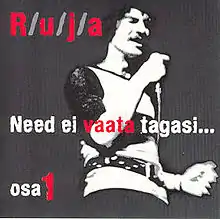Need ei vaata tagasi... Osa 1
Need ei vaata tagasi... (These won't look back...) is a 5-CD compilation by Estonian rock band Ruja. The purpose of this project was to release the whole of Ruja's works, although many songs are absent from the compilation.
| Need ei vaata tagasi... Osa 1 | ||||
|---|---|---|---|---|
 | ||||
| Compilation album by | ||||
| Released | 1999 | |||
| Genre | Progressive rock | |||
| Label | RUJA/HyperElwood | |||
| Ruja chronology | ||||
| ||||
Osa 1 (Part 1) contains the first 2 CD-s. It is followed by "Need ei vaata tagasi... Osa 2".
Track listing
CD1: Parandamatu (Irreparable)
- Õhtunägemus (Evening vision) (Rannap/Juhan Viiding) – 4:03 (1972)
- Tsepeliini triumf (Zeppelin's triumf) (Rannap/Viiding) – 6:14 (1971)
- Rukkilõikus (Rye harvest) (Traditional/Viiding) – 3:41 (1972)
- Nii vaikseks kõik on jäänud (It has all become so quiet) (Rannap/Ernst Enno) – 3:31 (1971)
- Noore fotograafi uppumine (The drowning of a young photographer) (Rannap/Viiding) – 3:31 (1973)
- Pajats (Zany) (Rannap/Rimmel) – 2:31 (1973)
- Enne seda suurt nalja (Before that big joke) (Rannap/Viiding) – 1:42 (1973)
- Parandamatu (Irreparable) (Rannap/Viiding) – 2:25 (1973)
- Vana auruvedur (Old steam locomotive) (Rannap/Eha Lättemäe) – 3:30 (1974)
- Ikaros (Rannap/Ilus) – 4:09 (1975)
- Ah, ma teadsin... (Oh, I knew it...) (Rannap/Heiti Talvik) – 2:41 (1973)
- Laul näidendist "Protsess" (A song from the play "Process") (Rannap/Komissarov) – 3:45 (1975)
- Tütarlaps kloaagis (Young lady in cloaca) (Rannap/Viiding) – 2:24 (1972)
- Sügispäev (Autumn day) (Rannap/Sinervo) – 3:23 (1973)
- Ülemlaul (Song of songs) (Rannap/Viivi Luik) – 4:57 (1973)
- Need ei vaata tagasi (These won't look back) (Rannap/Enno) – 3:59 (1971)
- Kel on laulud laulda (Who has songs to sing) (Rannap/Hando Runnel) – 3:38 (1979)
- Must lind (Black bird) (Rannap/Karl Eduard Sööt) – 5:33 (1981)
- Eesti muld ja Eesti süda (Estonian soil and Estonia's heart) (Rannap/Lydia Koidula) – 3:26 (1982)
CD2: Üle müüri (Over the wall)
- Mis saab sellest loomusevalust? (What will become of this pain of human nature) (Nõgisto/Alliksaar) – 7:33 (1976)
- Ei mullast (Not from the ground) (Kappel/Runnel) – 2:43 (1978)
- Avanemine (Opening) (Tüür/Erkki-Sven Tüür) – 4:19 (1978)
- Üleminek (Changeover) (Nõgisto) – 1:55 (1976)
- Laul teost (Song of a snail) (Kappel/Viiding) – 2:24 (1977)
- Klaperjaht (Chase) (Kappel/Viiding) – 1:11 (1976)
- Põhi, lõuna, ida, lääs... (North, South, East, West...) (Nõgisto/Viiding) – 6:05 (1978)
- Isamaa (Fatherland) (Kappel/Runnel) – 1:07 (1977)
- Ajaloo õppetund (A lesson in history) (Nõgisto/Viiding) – 2:32 (1978)
- Elupõline kaja (Life-indigenous echo) (Nõgisto/Viiding) – 4:49 (1978)
- Omaette (By itself) (Nõgisto/Viiding) – 2:40 (1978)
- Ha, ha, ha, ha (Couplet in Estonian) (Nõgisto/Viiding) – 4:15 (1978)
- Keldrikakand (Rough woodlouse) (Kappel/Runnel) – 0:58 (1977)
- Perekondlik (Familial) (Rannap/Runnel) – 3:38 (1979)
- Miks on teile jumalat vaja? (Why do you need God?) (Peeter Volkonski/Mati Unt) – 3:19 (1979)
- Kassimäng (Cat's play) (Nõgisto) – 2:49 (1977)
- Läänemere lained (Waves of the Baltic Sea) (Nõgisto/Juhan Liiv) – 3:13 (1977)
- Üle müüri (Over the wall) (Nõgisto/Viiding) – 3:39 (1977)
- Kaks pihtimust (Two confessions) (Kappel/Alender) – 7:44 (1976)
- Ahtumine (Narrowing) (Kappel/Artur Alliksaar) – 8:03 (1976)
Note: the two last tracks, "Kaks pihtimust" & "Ahtumine", are incorrectly switched on the back cover and in the booklet. There is also another song titled "Ahtumine", which is also on "Need ei vaata tagasi... Osa 2".
Personnel
Parandamatu
- Urmas Alender – vocals
- Jaanus Nõgisto – guitars
- Rein Rannap – keyboards
- Tiit Haagma – bass
- Raul Sepper – bass (4)
- Andrus Vaht – percussion
- Jaan Karp – percussion (14–19)
- Andres Põldroo – guitar (3, 13)
- Toomas Veenre – guitar (2, 4)
- Tõnu Kaljuste's chamber choir (1, 12, 16)
- Mixed choir "Noorus" (15, 17)
Üle müüri
- Urmas Alender – vocals
- Jaanus Nõgisto – guitars
- Margus Kappel – keyboards
- Priit Kuulberg – bass
- Ivo Varts – percussion
- Tiit Haagma – bass (1, 17–20)
- Andrus Vaht – percussion (1, 6, 14, 17–20)
This article is issued from Wikipedia. The text is licensed under Creative Commons - Attribution - Sharealike. Additional terms may apply for the media files.